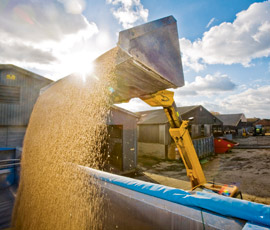Food output ‘throttled by overzealous policy makers’

Overzealous policy makers are thwarting Britain’s ability to become more self-sufficient in food, industry leaders have been told.
The withdrawal of key farm inputs – banned in many cases without scientific justification – threatened to curtail farm output with devastating effect, said David Caffall, chief executive of the Agriculture Industries Confederation.
Farmers’ ability to innovate and increase food production was as hampered by single-issue policy makers as it was by single-issue pressure groups, Mr Caffall told the Agribusiness 2014 conference on Wednesday (13 November).
“Despite the mantra of sustainable intensification, and the progress made by the research community our industry, our industry’s ability to meet [the government’s] call for more home-produced food is being restrained – some would say throttled – by overzealous regulation.”
Restrictions on fertiliser use and the withdrawal of pesticides, including neonicotinoids, meant UK annual inter wheat production could fall from 15m tonnes to just 8m tonnes within five years, Mr Caffall told delegates at the East of England Showground, Peterborough.
“I could paint a similar picture for livestock,” he said. Policy makers needed to take a more holistic approach towards regulation – both in the UK and across Europe. Failure to do so threatened to undermine farming’s ability to underpin Britain’s food and drink industry.
A return to a risk-based analysis rather than a hazard-based analysis – and a pragmatic and evidence – based approach to derogations – would allow agriculture to continue safely using many of the tools it needed to increase production, said Mr Caffall.
In a speech delivered by video, DEFRA junior minister Lord de Mauley told conference delegates he believed the government and industry could invest together in technologies that would help farmers produce more food sustainably.
The government’s £160m agri-tech strategy would enable producers to benefit from world class research, said Lord de Mauley. “We want to ensure that our farmers – our food industry, our consumers and ultimately our economy – benefit from new agricultural technologies.”
For more on this topic
More on UK self sufficiency
